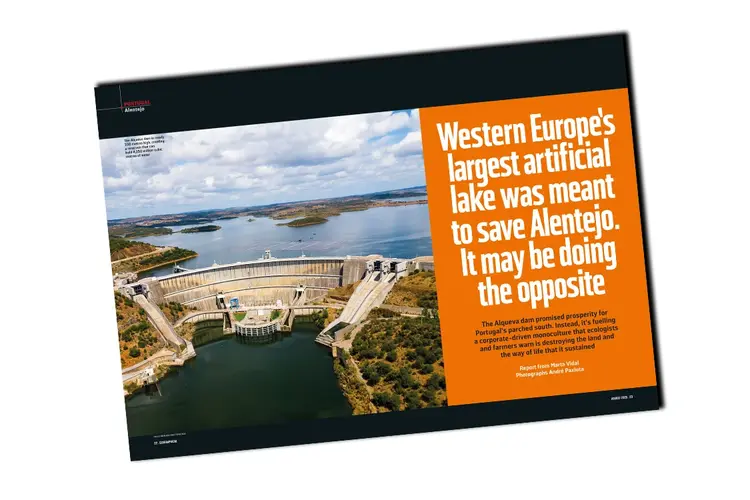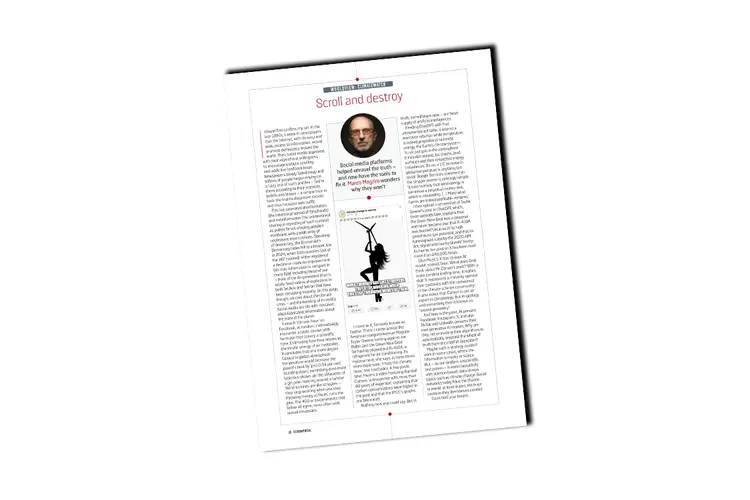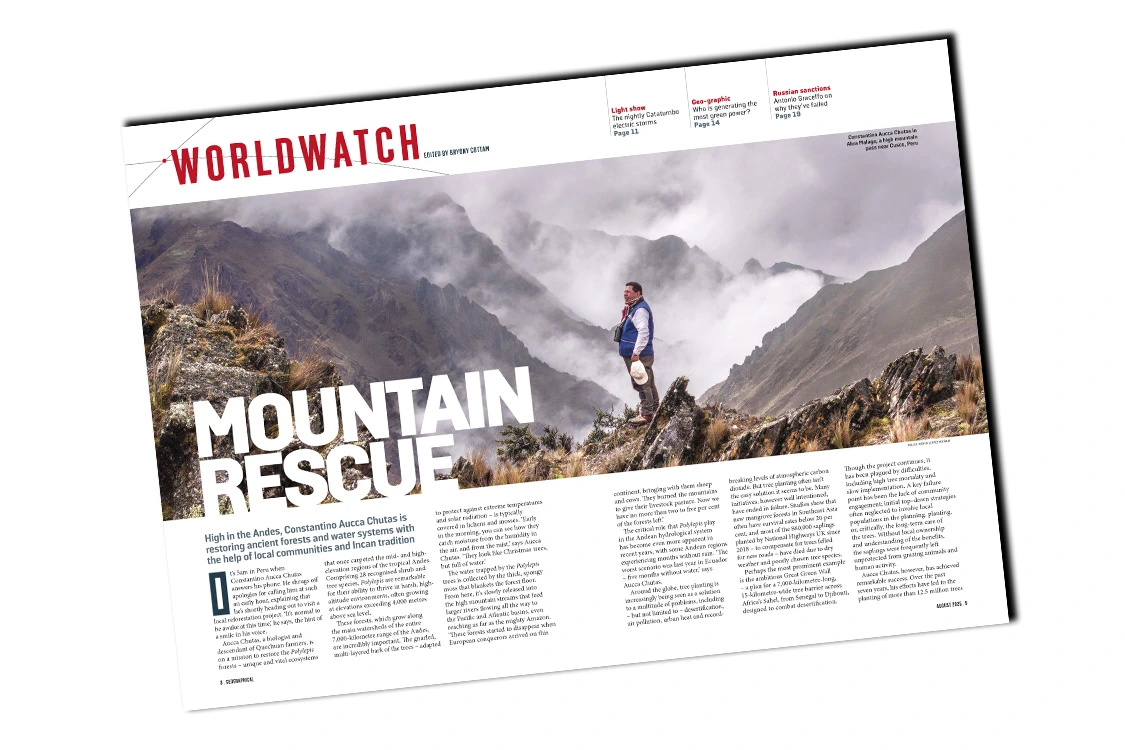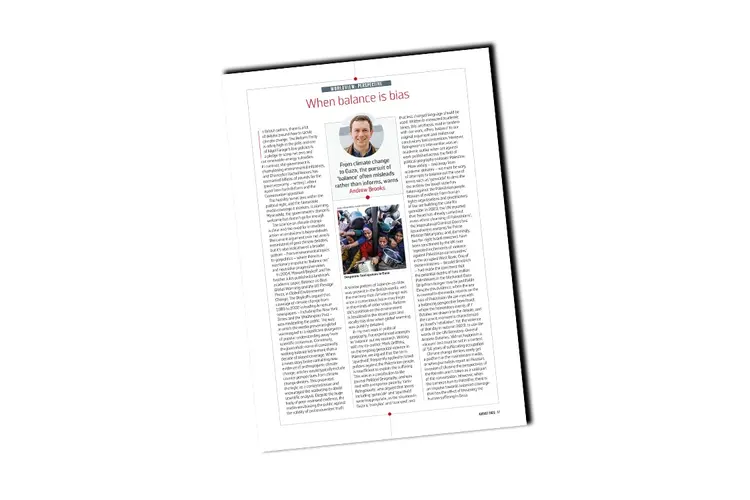
From a dam in Portugal to ancient forests in the Andes, join us as we explore the world in the latest issue of Geographical
In our August edition, discover more about how Portugal’s Alqueva dam is failing to meet the promise of prosperity it once held; peruse through an exhibition of works from female photographers examining the hidden costs of climate impacts, and head to Bhutan where Stuart Butler asks how the nation measures its happiness in the modern-day world.
Our columnists bring an array of topics to the forefront to help you stay on top of the world: Marco Magrini questions social media platforms and the difficulty in obtaining truth on them, while Antonio Graceffo discusses why sanctions have failed in Russia. Andrew Brooks considers how the pursuit of ‘balance’ in world news often misleads rather than informs.
We head to Sierra Leone where China’s appetite for lucrative sea cucumbers is fuelling a trade both full of exploitation and broken promises. And in our latest Passport, penguin researcher Pablo Garcia Borboroglu talks about ecotourism and how to travel responsibly.
Bryony Cottam explores how local communities are restoring ancient forests and water systems high in the Andes, while Rory Walsh travels through time and space to a London landmark that shaped the world. On the theme of exploration, Tristan Kennedy meets Sean Villanueva O’Driscoll and finds out more about his journey in traversing Patagonia’s fiercest ridge alone.
Our digital edition is out now, and you can not only read all the great stories in that issue, but our app also gives you access to our full archive dating back to 1935 with hundreds of magazines to explore. And if you want to enjoy our beautifully designed and produced print magazine, we can post the next edition to you anywhere in the world. Join us and stay on top of the world!
Damning developments

When Portugal’s Alqueva dam was completed in 2002, it promised economic rejuvenation for the sun-scorched south. But as Marta Vidal reports from the region of Alentejo, that future has turned decidedly sour.
Instead of supporting traditional farmers, the dam’s waters are disproportionately diverted to massive corporate olive and almond plantations. These thirsty monocultures are replacing biodiverse montado forests and upending ancient landscapes in a rush for profits.
Eva Barrocas, a small organic farmer, laments how water from the dam never reaches her crops. Meanwhile, big names like Elaia and De Prado soak up resources for their super-intensive hedgerow olive groves. Environmental scientists and campaigners warn of irreversible soil erosion, habitat collapse, and rising desertification risk, all worsened by climate change.
The €2.5 billion dam – once hailed as Portugal’s greatest rural investment – is now at the heart of a bitter debate about sustainability, equity, and what we lose when short-term agribusiness trumps long-term stewardship.
Scroll and deceive

Marco Magrini’s latest Climatewatch dives into the increasingly surreal (and dangerous) world of climate misinformation online.
Once a digital optimist, Magrini now observes a darker landscape—where social media platforms that once promised truth and transparency now perpetuate chaos and conspiracy. From Facebook memes comparing wind turbines to strippers, to viral posts declaring global warming a hoax, the misinformation mill never sleeps.
But there’s a twist. Artificial intelligence may now hold the key to countering these climate lies. Magrini puts today’s AIs to the test – ChatGPT, Google Gemini, even Elon Musk’s Grok – feeding them viral falsehoods. The results? Surprisingly rational rebuttals. The AI systems quickly debunk pseudo-science, explain policy decisions, and unpick misleading claims.
So why aren’t the platforms deploying these tools more proactively? With the tech now capable of filtering truth from fiction, especially in science-based topics like climate, Magrini wonders if the real issue isn’t ability, but willingness.
If social media helped break the public trust in climate science, could it also help rebuild it? Or are the algorithms too addicted to clicks to care?
Mountain magic

High in the misty peaks of the Andes, Constantino Aucca Chutas is leading a quiet revolution. A Quechuan biologist with a passion for trees and tradition, he’s helping restore the rare Polylepis forests – gnarled, water-catching woodlands once vital to the region’s hydrology and biodiversity.
Centuries of deforestation left only a threadbare remnant. Now, thanks to Aucca Chutas and his team, more than 12.5 million trees have been planted across Peru and neighbouring countries.
But this is no ordinary tree-planting initiative. Drawing on the Incan principle of Minka –communal work for the common good – his model centres local communities, traditional knowledge, and ecological precision. Seedlings are timed to the rhythms of the rainy season, grown from native stock, and planted with care, not haste. The result: resilient reforestation that benefits both people and ecosystems.
As climate extremes grip the Andes and water scarcity worsens, these enchanted forests may offer more than shade and scenery. With limited funding and rising demand, Aucca Chutas must be selective. But in a world of fast fixes and failed green projects, could this grassroots model be the one that truly takes root?
Are sanctions really as effective as they seem?

When the West imposed sweeping sanctions on Russia in 2022, the goal was clear: cripple the economy and pressure Putin to end the war in Ukraine.
But three years on, those sanctions have backfired in unexpected ways. Far from collapsing, Russia’s economy has adapted – and even grown – fuelled by wartime spending, high energy revenues and a pivot to Chinese trade.
Antonio Graceffo charts how sanctions helped build a fortress economy. Capital controls, black-market oil sales, and asset grabs from foreign firms have strengthened state control and enriched regime loyalists. Even as consumer goods continue to reach Russia via third-party routes, internal investment has surged—though mostly in military-linked industries.
Despite warnings of cracks, the system is holding. Instead of toppling Putin, sanctions have tightened his grip. With Russia still the world’s 11th largest economy and support bolstered by wartime job creation, the West faces a hard truth: economic isolation isn’t ending this war. It’s entrenching it.
Happiness under pressure

Bhutan has long been hailed as a global outlier – a carbon-negative country where Gross National Happiness (GNH), not GDP, guides policy. But as Stuart Butler reports from the valleys and peaks of this Buddhist kingdom, the balance is getting harder to maintain.
With modern lifestyles spreading, plastic piling up and demand for development rising, Bhutan faces a dilemma: how to meet its people’s aspirations without losing its environmental soul. Visionaries like Nidup Tshering and Rikesh Gurung are tackling the waste problem head-on by turning plastic bottles into clothes, desks and even roads.
Meanwhile, efforts like the Million Trees Project and timber-based construction show how innovation and tradition can work in harmony.
At the heart of it all is Bhutan’s spiritual ethos. Respect for all life forms still shapes decisions, from tiger conservation to recycling. As one monk preparing for a lifetime of mountain meditation puts it: ‘It will make things better.’ In a world driven by speed and profit, Bhutan may just offer a different path if it can hold its nerve.
The myth of balance

In his searing column, Andrew Brooks dismantles the journalistic obsession with balance, arguing that in today’s media landscape, so-called neutrality often means complicity. From climate change to Gaza, the impulse to present ‘both sides’ frequently muddies the truth rather than clarifying it.
Brooks traces this trend back to media coverage of global warming, where efforts to ‘balance’ scientific consensus with denialist noise delayed public understanding for years. That same instinct, he argues, now infects coverage of Israel’s war on Gaza.
Despite mounting evidence – from UN reports to ICC warrants – that genocide is under way, the media routinely frames Israeli actions as ‘retaliation’, equating the suffering of two million besieged civilians with state narratives of security.
It’s a false symmetry. Climate deniers no longer get column inches. Nor do Kremlin talking heads on Ukraine. So why, Brooks asks, are Palestinian deaths still so readily ‘balanced’ away? When the evidence of atrocity is overwhelming, neutrality is no longer noble – it’s dangerous.




